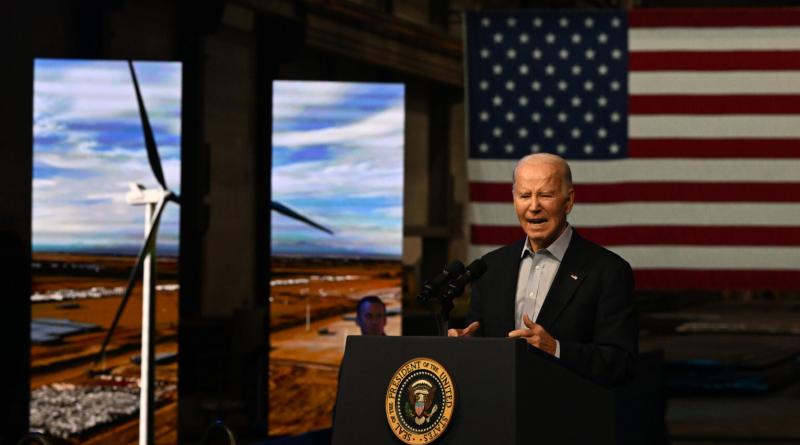COP28 Promised Fireworks. Back in the US, the Climate Wars Rage On

President Biden skipped the U.N. summit to campaign back home on clean energy investments, while Republicans called for more fossil fuels, even as U.S. oil production hits record highs.
President Joe Biden may be skipping the global climate talks abroad, but that didn’t stop him from addressing the issue back home as he stumped in Colorado this week to criticize Republican lawmakers for impeding his climate efforts.
Speaking Wednesday at a Colorado wind tower manufacturing plant, Biden took aim at U.S. Rep. Lauren Boebert, a Republican firebrand who has called the dangers of climate change “fake news” and referred to the Inflation Reduction Act, which includes some $370 billion for climate efforts, as “a scam.”
“The historic investments we’re celebrating today is in Congresswoman Boebert’s district,” Biden said at the press event. “She, along with every single Republican colleague, voted against the law that made these investments and jobs possible. And that’s not hyperbole, that’s a fact. And then she voted to repeal key parts of this law.”
While climate change is a settled matter among scientists, U.S. politicians continue to debate the issue, often heatedly. The result is that Congress remains largely gridlocked at the federal level, while states create a patchwork of varying policies that—depending on the political leanings of elected officials—either advance or hinder the effort to slash the nation’s greenhouse gas emissions.
Democrats widely agree that addressing climate change is a top priority, but Republicans have broadly rejected nearly all efforts to tackle the issue, with some party leaders instead vowing to wage war on so-called “woke” progressive policies.
Evidence of this tumultuous dynamic isn’t hard to find.
In Michigan, Democratic Gov. Gretchen Whitmer on Tuesday signed a slate of climate related bills into law, one of which requires the state’s power companies to produce all of their electricity from clean energy sources such as wind or solar by 2040. And in New Jersey, Democratic Gov. Phil Murphy last week adopted a new rule that will ban all new sales of gas-powered cars in the state by 2035, joining 10 other states that adopted the aggressive climate policy originating from California.
Connecticut, however, failed to adopt that same gasoline car ban when Democratic Gov. Ned Lamont withdrew the proposal this week after learning it lacked Republican support in a key legislative committee. In Texas, which has long been controlled by the GOP, the influential State Board of Education voted two weeks ago to reject new science textbooks that accurately described the causes and effects of climate change, handing a win to Republicans in the state who said the books painted fossil fuels in too poor a light.
Even in progressive havens like New York, which has one of the most aggressive climate laws in the nation, political infighting between lawmakers from opposite sides of the aisle threatens to slow climate action. In May, Americans for Fair Treatment, a nonprofit with funding ties to hard-right conservative groups, including think tanks established by oil barons Charles and David Koch, sued the city after former Mayor Bill de Blasio decided in 2018 to divest the city’s public pensions from fossil fuel holdings.
The group, whose lead counsel is Trump-era Labor Secretary Eugene Scalia, argues that the city’s divestment decision was “politically motivated” and violates fiduciary obligations. And if successful, the legal challenge could provide fresh ammunition for Republicans who have targeted climate-friendly investment funds in recent years, hoping to keep money flowing to fossil fuel companies. That case will soon go before the New York Supreme Court.
On Wednesday, as delegates from nearly 200 nations prepared for what could be one of the most important global climate conferences ever convened, members of Congress argued in a House subcommittee hearing over whether the United States should even consider transitioning away from fossil fuels at all.
“This forced transition will leave our economy dangerously dependent upon supply chains from China and make energy less affordable, less reliable for Americans,” said Rep. Cathy McMorris Rodgers, a Republican from Washington state. “We should instead be working to build on our remarkable legacy.”
Considering the U.S. is on pace to produce more oil in 2023 than any other year, it would appear that legacy is as strong as ever.






